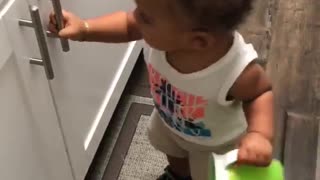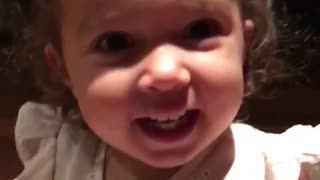Frustrated Baby Hysterically Rage Quits
Check out how this baby reacts after several failed attempts at getting the straw into the cup hole. Hilarious!
Have you ever seen a reaction as fun as this baby's after not being able to put his straw in the hole in the cup? Like anyone, babies also feel emotions such as anxiety, frustration and anger, so some babies often tantrums when things are not going well. In this case, you can see how this adorable baby gets angry because he can't put the straw inside the hole of his cup. At first everything seemed to be in order, but finally the baby's patience was over and he threw the glass away from him. It is the most fun you will see!
If you care for or educate children of initial age, you have surely lived on more than one occasion the famous “tantrums”. Whether the child cries, shouts, throws things, falls to the ground, it is not always easy to handle; and it is possible that sometimes, you feel annoying and helpless before these behaviors. You may have tried different alternatives, some may be useful at the time, however, it is possible that they work only for a while or that in the long run worsen children's behavior.
It is normal for children between 1 and 3 years of age to throw tantrums, however, depending on how you handle them you can favor the presence of challenging behaviors or, on the contrary, promote independence, self-esteem and emotion management in the child. When children are young, they still don't know how to regulate and express their emotions properly; these arise spontaneously without conscious decisions, which causes them to lose their dominion over themselves, that it is hard for them to think before acting, anticipate the consequences of their behavior and make it difficult for them to act according to the established norms . Children usually cry, scream or tantrums when they face situations in which they feel frustrated, angry, afraid, anguished or as a response to their desire to be more independent.
It is possible that when a child throws tantrums in your presence, you feel angry, ashamed, impatient or helpless6. Maybe because you think he does it to get something or because he wants to disobey you, however, this is not the case. In response, it is common for adults to seek to modify the child's behavior, isolating it, ignoring it, sending it out on time, threatening it, criticizing it, giving it a sermon or punishing it; to force him to modify the emotional state that causes him discomfort. However, they rarely notice the feelings behind the behavior. This type of response increases the feelings of anxiety or anxiety in the child, which causes a negative dynamic and increases the permanence and subsequent presence of tantrums. In addition, it is difficult for children to scold or scream children learn from this experience, because their emotional states are so intense that they have little energy to learn.
Although punishing, hitting or shouting, may have immediate results, he will not be able to understand how to properly express his emotions, nor will he develop his autonomy and responsibility; there is also the possibility that he later has difficulties in handling conflicting or frustrating situations and it is difficult for him to develop close, empathic and reliable relationships with others.
-
 1:03
1:03
ViralHog
4 years ago $4.05 earnedBaby Hysterically Laughing At Mom's Fake Sneezes
6.45K2 -
 0:35
0:35
AFV
5 years agoTwo Dogs make Baby Laugh Hysterically
2.18K1 -
 0:26
0:26
Darlines_
4 years ago $4.30 earnedBaby Gets Adorably Frustrated When Pranked By Mom
8.3K8 -
 0:12
0:12
ViralHog
4 years ago $0.25 earnedFrustrated Toddler Tries to Open Cabinet
1.3K1 -
 0:42
0:42
mktgdelrio
4 years ago $7.21 earnedLittle Girl Hysterically Laughs At Her Own Farts
28.1K -
 0:53
0:53
MESMES1001
4 years ago $5.13 earnedToddler Hysterically Gets Comb Stuck In Her Hair
7961 -
 0:17
0:17
mrmurphy
4 years ago $5.06 earnedFrustrated puppy totally rage quits mobile video game
2.52K -
 0:36
0:36
AFV
4 years agoPeekaboo Baby
432 -
 3:06
3:06
AFV
4 years agoBest Baby Laughs
3.6K3 -
 3:12
3:12
AFV
4 years agoBaby Dictators
3241